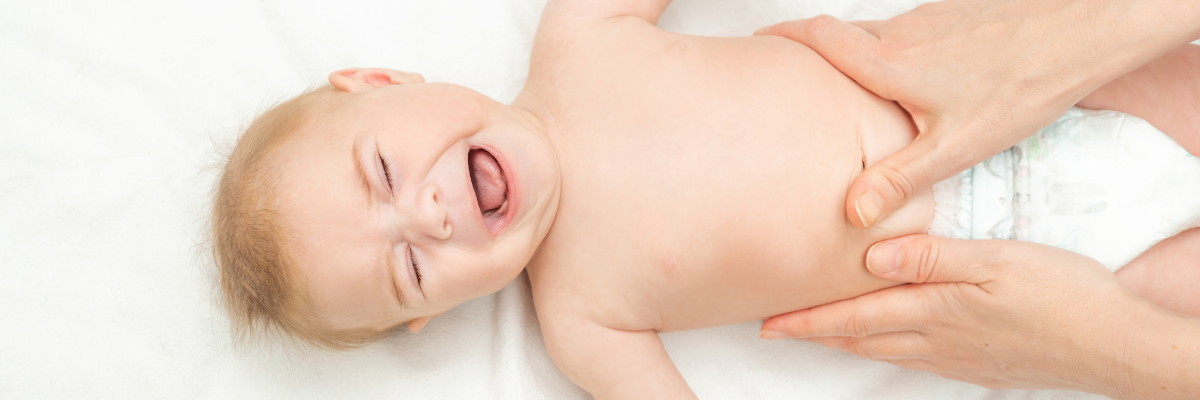Baby Screaming in Pain From Gas: Steps to Take
One of the problems that babies often encounter as part of their healthy growth processes is gas pain. Gas pain is a common condition, especially in newborn babies, which can be of concern for parents. In this article, we will talk about the methods that can be applied to understand gas pain in babies, recognize their symptoms and alleviate this condition.
What Does Colic Mean?
Colic is a condition that is characterized by prolonged and uncontrollable crying bouts, usually seen in newborn babies. This condition starts, especially at the age of the baby, three weeks of and can end at about three to four months of age. Babies who experience colic tend to cry more, usually at certain times of the day, especially in the evening.
Symptoms of Colic
Babies with colic have bouts crying bouts are usually severe and the baby cannot be comforted. Crying, often starting in the evening and can last for several hours. Babies with colic usually pull their legs to the stomach, squeeze their punches and their faces red. Crying bouts begin suddenly, and most babies tend to release gas during this time, leading some experts to believe that this may be related to the digestive system.
Causes
The exact cause of colic is unknown, but many theories exist. These may include difficulties in the immature form of babies' digestive systems, nutritional allergies or sensitivities, overstimulation, or the way they interact between the parent and the baby. It is also thought that some foods in the mother's diet can trigger gas and colic symptoms in babies.
Management and Treatment
A variety of strategies are recommended for managing colic condition. These include keeping babies in a calm environment, creating regular feeding hours and comforting babies with relaxing movements. It can give babies degassing drops or breastfeeding mothers can reduce potential allergens by changing their diet. Support from parents can also help them manage this challenging period.
Colic can be a compulsive condition for parents and caregivers, but usually it decreases as the baby grows and does not require special medical treatment. However, if the crying bouts in babies are beyond normal or accompanied by other symptoms, it is best to consult a health professional.

What Causes Gas in Babies?
Gas problem in babies is quite common and can often be a concern for parents. Gas can disrupt babies' comfort and cause bouts of crying. So, what are the main causes of this situation?
1. Air Swallowing
Babies swallow air, especially during breastfeeding or bottle feeding. If the baby is not sucking correctly or the bottle's pacifier is not suitable, it may swallow too much air. In addition, babies can swallow air during crying.
2. Development of the Digestive System
The digestive system of a newborn baby is not yet fully developed. This can cause some sugars (such as lactose) and proteins that are difficult to digest to make gas. The intestinal flora of babies also begins to form in the first months, which can increase the formation of gas.
3. Nutritional Factors
Diets of nursing mothers can sometimes lead to gas formation in babies. Especially foods that have gas-making properties such as broccoli, cabbage and dried beans can cause gas problems in the baby when it is too much in the mother's diet.
4. Nutritional Disorders
Babies' feeding hours are irregular and excessively fast or slow feeding can also make gas. Babies sometimes want to be fed more often because of the gas pain that can be confused with hunger, which can lead to a vicious circle.
5. Food Sensitivities or Allergies
Some babies may have sensitivity to certain foods. For example, intolerance to cow's milk protein can cause problems such as gas, diarrhea and restlessness.
6. Baby's Activity Level
In infants with low activity levels, the tendency of gas to accumulate more can be observed. The movement helps to remove the gas naturally from the body.
7. Anatomical or Functional Problems
In rare cases, the gas problem can be caused by anatomical or functional problems. For example, conditions such as narrow or blocked intestines should be evaluated by a pediatric doctor.

What are the Symptoms of Gas Pain in Babies? How to Understand?
Gas pain is a fairly common condition in babies and can be a cause for concern for parents. Here are some symptoms that should be known to understand and recognize gas pain in babies:
1. Crying Seignues
The most obvious symptom of gas pain in babies is long crying bouts that cannot be comforted. These cries usually start suddenly and no matter how hard the baby tries, it cannot be easily calmed down. Babies who experience gas pains usually make loud and interrupted sounds when crying.
2. Tension in the Abdominal Area
Due to gas compression, babies' abdomens may appear tense and swollen. Parents can notice this tension by lightly touching the baby's stomach. This area usually hardens, as gas compression causes increased pressure in the abdominal area.
3. Lifting and Pulling Your Legs
Babies, when they suffer from gas pain, usually pull their legs towards their abdomen to relieve discomfort and pain. This movement can help reduce pressure in the abdominal area.
4. Degassing and Belching
Babies who experience gas pains can often gas or belt. This means the expelsion of excess air accumulated in the digestive system and often provides temporary relief.
5. Facial Expressions and Physical Reactions
When babies have gas pains, facial expressions may change; for example, they may wrinkle or blush. They may also exhibit more restless behaviors to express their discomfort.
6. Nutrition and Sleep Problems
Gas pains usually occur during or after feeding. Babies may refuse to feed during these periods or often stop while feeding. In addition, gas pains can disrupt sleep patterns, babies can wake up frequently during the night.
7. Vomiting or Reflux
In some cases, digestive problems such as vomiting or reflux can also be observed in babies along with gas pain. This can be due to an increase in pressure in the digestive system.

How Long Does Gas Pain Last in Babies?
Duration of Gas Pain
Babies usually start experiencing gas pains in the first weeks after birth. This can continue for the first three to four months in most babies. However, as babies' digestive systems mature and transition to solid foods, gas pains usually subside.
3-month Period
The first three months are considered the period when gas pain is most intense. Since the digestive system of babies is still developing during this period, gas pains may be more frequent and severe. This period is followed by a process also called "Three Monthly Colic" and gas pains begin to decrease in this process.
Six-Month Period
Around the sixth month, many babies begin to switch to solid foods, which makes their digestive system work more efficiently. During this period, the frequency and severity of gas pain usually decreases.
When to Consult a Doctor?
If the baby's gas pains last for more than six months or its severity increases instead of decreasing, this may be a sign of other health problems. It is also important to consult a doctor if there are other symptoms such as fever, vomiting, diarrhea, weight loss or decreased nutrition along with gas pain.
General Recommendations
- Using the right position and techniques when feeding the baby,
-
Review of the baby's diet,
-
Regular application of methods to help degass,
-
If breastfed, it is recommended that the mother avoid the gas-forming foods in her diet.

How to Remove the Baby's Gas? What are the Gas Extraction Methods?
Gas compression in babies is a very common problem. In this case, there are several effective methods that parents can apply:
1. Proper Nutrition Techniques
- Breastfeeding Position: When breastfeeding, make sure that the baby's head is slightly higher than the chest level. This position helps prevent the baby from swallowing air.
- Baby Bottle Selection: Specially designed anti-colic bottles can be used to reduce air swallow. These bottles regulate the air flow and prevent the baby from swallowing excess air.
2. Degassing by Hitting Your Back
- Tap the baby on the back by tilting it on your shoulder. Hold the baby's belly on your shoulder and gently apply rhythmic blows to the back. This helps push the air accumulated in the stomach upwards and belp.
3. Abdominal Massage
- Lay the baby on his back and make a 'bike pedal' movement by pulling his legs slightly towards his stomach. This stimulates bowel movements, helping the gas to advance and exit.
- Gently massage the baby's abdomen clockwise. This helps the gas to get out more easily by supporting the digestive system.
4. Don't Keep The Baby Upright
- Keeping the baby in an upright position for at least 20-30 minutes after feeding makes it easier for the air bubbles in the stomach to go up and burp.
5. Hot Compress Application
- Applying a warm (but not burning the baby's skin) cloth or compress to the baby's abdomen can help relax the muscles and get out of the gas. This method can be relaxing especially in baby pain times.
6. Quiet and Calm Environment
- It is important to provide a noiseless, lightly lit environment to calm and relax the baby. A comfortable environment can make the baby cry less and therefore swallow less air.
7. Paying Attention to Nutrition
If you are your mother and breastfeeding, it may be beneficial to avoid gas-forming foods. Some babies may be affected by certain foods that the mother eats.

What Happens If The Baby Doesn't Get Gas?
1. Increased Discomfort and Crying
Gas can cause pain and discomfort when stuck in babies' digestive systems. This can lead to long-term and unconsolable crying seizures in the baby. Due to the pain, the baby becomes restless and usually pulls his legs towards his stomach.
2. Sleep Problems
Gas pains can disrupt babies' sleep patterns. The discomfort experienced due to gas can cause the baby to wake up frequently and not get a deep sleep. This can make both the baby and parents feel tired.
3. Nutritional Difficulties
Babies who suffer from gas pains may also be uncomfortable during feeding. The pressure they feel in their bellies due to gas can cause them to cry during sucking or finish feeding early. This can lead to malnutrition and development problems.
4. General Unrest
Stuck gas can cause general restlessness of babies. In this case, babies usually cry more, interact less and are generally less happy.
5. Health Problems
Prolonged and recurrent gas pain can be a symptom of more serious health problems in some cases. For example, conditions such as food intolerances or allergies, anatomical problems with the digestive system, can cause frequent gas pains.
What Can Be Done?
If the gas problem in the baby becomes continuous and relief cannot be achieved by the methods mentioned above, it is important to meet with a pediatrician. The doctor can evaluate the causes of the gas in the baby and possible solutions. In addition, tests can be done to determine if the baby has allergies or intolerances. Early intervention is important to protect and relieve the general health of the baby.

What can be done to comfort the baby?
1. Tight Hug (Swaddling)
It is an effective method to make babies feel safe and comfortable by wrapping them tightly. This technique calms babies by creating a limited environment like in the womb.
2. Calming Sounds
Babies may enjoy hearing relaxing sounds. These sounds may include white noise, light music, or sound machines that mimic heartbeat sounds. Such sounds help the baby sleep more easily by blocking other outside sounds.
3. Gentle Massage and Abdominal Massage
Gently massaging your baby, especially light massages to the abdomen to relieve gas compression, can help relax them. Massages on the feet and legs can also be calming.
4. Movement
Babies sometimes like to move. For this, baby swings, walks in baby carriers or car driving can be useful. Shaking it lightly or taking a stroller can also calm babies.
5. Heat and Comfort
Using a baby blanket, keeping your baby warm can make them feel safer and more comfortable. Also, babies often find contact with body temperature relaxing, so it can be beneficial to wrap them up with them in your lap.
6. Routine Creation
Establishing a regular sleep and nutrition routine can help babies understand what to expect and feel more comfortable. Sleep time routines, especially calm activities before bedtime, help babies go to sleep.
7. Bathroom Time
A warm bath can be very relaxing for most babies. Keeping babies warm after the bath and drying them immediately can also make them feel comfortable.
8. Distractions
Offering toys or activities that will attract babies' attention can help relieve them, especially in moments of gas pains or restlessness. Colorful toys, light music or touch-sensitive books may be of interest.
9. The Calmness of Parents
Babies can feel the emotional state of their parents. Being calm and relaxed as a parent can help babies feel more comfortable, too. It is important to focus on breathing deeply and staying calm during stressful times.

Natural Solution for Your Baby's Comfort: Clooe Tummy Oil
You can safely choose Clooe Tummy Oil Baby Massage Oil to relieve diseases such as gas pain and colic in your babies in natural ways. The formula, which contains this 100% natural plant oils, provides both relief and supports the digestive system when gently applied to your baby's abdominal and foot areas. This product, which is also ideal for dry and sensitive skin, contributes to the development of a healthy skin flora by preserving the natural moisture of the skin. Now try this unique massage oil and relax them while strengthening the bond between you and your baby. Click here to review and buy the product.
Important Information
All this shared information is for general informational purposes only and cannot replace professional medical advice. In any health problems or special situations related to your pregnancy process, please contact your doctor first for the most accurate information and guidance. Please note that any health-related decisions and treatment processes should be guided by health professionals as a result of a detailed assessment of your personal health status.